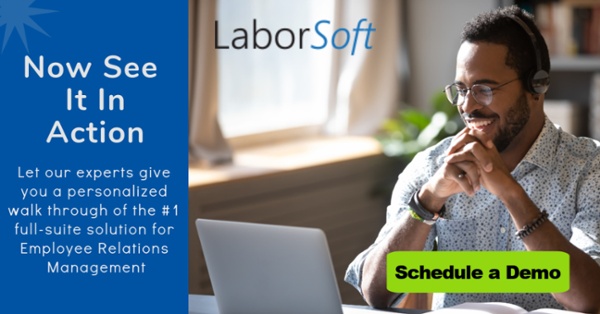HR Compliance Essentials for Employee Data Management
Read Time 5 mins | Nov 19, 2025 | Written by: LaborSoft

The digital workplace of the 2020s has pushed HR departments to manage more employee data than ever before. Databases span payroll, benefits, training, employee records, disciplinary actions, grievances, and arbitration outcomes. Each record carries both operational importance and potentially significant implications for compliance. In other words, data management has become the beating heart of HR compliance.
Consequences for mishandling or losing sensitive information can be severe. Missteps could lead to violations of privacy laws, Department of Labor investigations, and long lasting reputational harm that damages public and employee trust. HR leaders are feeling the pressure to think of modern “big” data management not as administrative housekeeping but as a compliance mandate.
Forward-thinking organizations have quickly pivoted towards centralized, cloud-based platforms like LaborSoft to manage their employee records. Purpose-built software solutions make it far simpler to handle priorities like enforcing retention policies and ensuring transparency in every stage of the data lifecycle.
The Compliance Imperative
Every piece of employee information — whether it’s a performance review, FMLA certification, or grievance document — is governed by a web of federal and state regulations. HR professionals must comply with standards related to data retention, privacy, access, and disclosure, all while maintaining readiness for audits or legal inquiries. The below points are just a few of today’s compliance essentials:
1. Adherence to labor law data retention requirements
HR must store records like payroll, timecards, and investigation files for legally required periods. For example, the Fair Labor Standards Act (FLSA) and the Equal Employment Opportunity Commission (EEOC) have specific timeframes for how long records must be retained.
2. Role-based access controls
Not every employee should have access to every record. Role-based permissions are an easy way to guarantee only authorized HR, legal, or compliance personnel can view relevant sensitive data such as arbitration documents or employee grievances.
3. Regular compliance audits
Periodic internal audits help confirm that your documentation practices align with policy and law. This includes reviewing file completeness, verifying that grievance and arbitration outcomes are archived properly, and confirming that no sensitive data is stored in unsecured systems or personal devices.
4. Digital security and privacy
We know that cybersecurity threats on the rise from annual reports put out by research firms like Gartner. It’s become non-negotiable for HR systems to employ encryption, secure authentication, and audit logs to protect personally identifiable information (PII) and confidential labor relations data. Failure in any of these areas can open the door to fines, lawsuits, or employee relations fallout.
Centralization Makes Reporting Easy
HR data is still scattered across multiple systems for many organizations: payroll software, shared drives, spreadsheets, and physical files. This fragmentation increases the risk of inconsistencies and compliance gaps.
A centralized system like our LaborSoft case management software creates a single source of truth for all HR-related documentation. Every grievance, arbitration, and compliance record is stored securely in one cloud-based environment with complete version control and audit visibility.
This structure simplifies compliance, but moreover, it empowers HR to respond swiftly to information requests from internal leadership, investigators, auditors, or regulatory agencies. It’s easier to find, verify, and share exactly what’s needed at no cost to broader employee confidentiality.
Digital Tools Strengthen Trust
Compliance cannot be viewed as a set of checkboxes; it’s a foundation for organizational trust. When employees know their personal and professional information is handled ethically and securely, confidence in HR and leadership grows. This is doubly important when just a third of HR.com survey respondents say their organization's legal compliance processes are “highly mature.”
LaborSoft was designed to strengthen that trust through digital governance:
- Secure, role-based access: Only authorized users can view or edit case files, protecting privacy and preventing data misuse.
- Audit-ready reporting: Every change to a file — whether uploading a grievance statement or updating an arbitration outcome — is logged automatically.
- Automated retention and archiving: The system enforces data retention policies automatically, ensuring compliance with labor law timelines.
- Integrated compliance workflows: LaborSoft links related cases (e.g., employee grievances tied to arbitration or compliance reviews), giving HR full visibility across the employee lifecycle.
These capabilities transform compliance from a reactive burden into a proactive, technology-driven discipline.
The Role of HR in Ethical Data Stewardship
Compliance officers and HR leaders share responsibility for ethical data management. Beyond meeting legal standards, this means fostering transparency and accountability within the organization.
- Communicate clearly how employee data is collected, used, and stored.
- Train staff regularly on data privacy and security protocols.
- Review access rights whenever employees change roles or departments.
- Maintain cross-functional alignment with IT, legal, and labor relations to ensure consistent compliance practices.
If your organization makes compliance a part of everyday HR culture, your relationships with employees, unions, and regulators alike will soon help all stakeholders to recognize you as a trusted steward of information.
Technology-Driven Compliance, Powered by LaborSoft
HR will only continue to digitize, and compliance must evolve in parallel. LaborSoft empowers HR teams to manage employee information with confidence and compliance. Connect grievance tracking, arbitration documentation, and labor law compliance within one secure, integrated system for greater peace of mind.
LaborSoft automates documentation, enforces access controls, and maintains audit trails to eliminate uncertainties and make sure your HR department is always prepared for internal or external review. 

